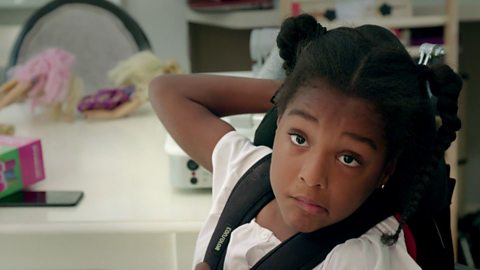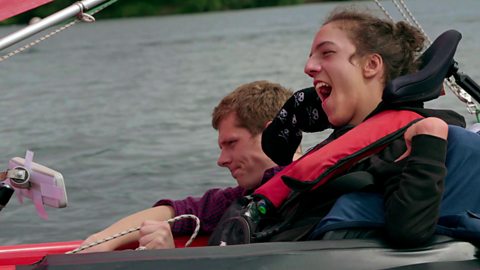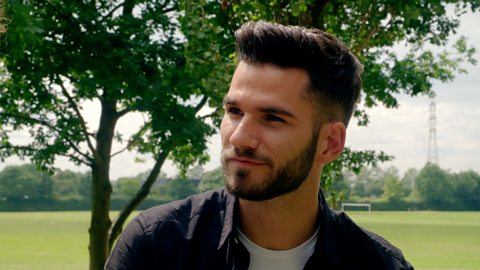NARRATOR:
Meet designers and engineers, Ross Atkins and Akram Hussein. They're on their way to meet 26-year-old Greg. After a car crash, he was left paralysed from the neck down and has speech problems.
ROSS:
This is the most important part of inventinGREG: meeting Greg, finding out about his environment and about what he wants to do and then working out the pieces of technology that might help.
NARRATOR:
Greg lives in an assisted living apartment where he receives support with everyday tasks, but he's hoping Ross and Akram can help him to stay safe outside of his home.
GREG:
Come in.
ROSS:
Hi, Greg, I'm Ross.
GREG:
All right.
AKRAM:
Hiya, how you doing?
ROSS:
This is Akram.
GREG:
Forgive me for not standing and getting the door, but um-.
ROSS:
That's all right.
GREG:
Take a seat and uh we'll get into it.
AKRAM:
Cool.
GREG:
Five years ago this happened in a car accident, before that, I was very independent. Do you wanna see some old photos?
AKRAM:
Yeah, that'd be great. Yeah.
GREG:
I need one of you to put that headset over the top of my head.
NARRATOR:
Greg has no control of his arms and is only able to operate devices like the computer mouse with his head.Having a good time?
GREG:
Yeah, always.
AKRAM:
I think it would be really interesting for Ross and I to see what it's like for you when you're out and about, going from home.
GREG:
Perfect. Yeah.
AKRAM:
Is that all right?
GREG:
Yeah.
AKRAM:
So why don't we head into the city centre and we'll-, we'll walk with you and we'll see-.
GREG:
Yeah, great.
AKRAM:
Yeah? Cool.
GREG:
No problem.
AKRAM:
Shall I grab the headset?
GREG:
Please, yeah.
AKRAM:
After you.
ROSS:
How are you driving yourself?
GREG:
The headrest controls the chair.
AKRAM:
Are we on speed five?
GREG:
Yeah, yeah.
AKRAM:
Sweet.
NARRATOR:
In order to remain active, Greg makes a journey from his home to Bristol city centre on most days.
GREG:
What do you want, Akram?
AKRAM:
Uh I'll take a latte if it's okay.
ROSS:
Same please.
GREG:
Three lattes please.
W:
Of course, that's seven eighty please.
GREG:
Would you mind doing my um card for me please.
W:
Yeah, of course.
So is this what you have to do every time you buy things?
GREG:
Yeah, yeah. Perfect, cheers.
W:
There we go. No problem.
GREG:
That all right?
W:
That's all good.
NARRATOR:
For smaller payments, contactless is an option, but for anything costing over £30, Greg has to give out his pin number.
GREG:
Thank you, cheers.
W:
No problem, take a seat, I'll bring those over.
GREG:
Cheers, thanks.
AKRAM:
Um it's just been really, kind of, shocking that he's managed to not-, not have his phone or-, or his cards taken away from him, um he has to trust people.
ROSS:
Yeah.
NARRATOR:
Ross and Akram begin to examine options to help Greg communicate and operate his phone in an emergency.
ROSS:
So I'm in my attic and um I found this which is a Bluetooth um access switch, this can drive an iPhone or an Android device uh using switch access mode, um so you just press it.
NARRATOR:
Ross and Akram want to place additional switches in Greg's wheelchair headrest so he can control his phone. As Greg can't use his hands, their plan is to see if they can enable him to make contactless payments by pressing switches with his head.
Typing style. Large cursor.
NARRATOR:
With the phone control prototype ready for testing, Ross and Akram are back in Bristol to see Greg.
GREG:
So [? how much do I ] feedback or-?
ROSS:
I think we've got some stuff that stands a chance of helping,
GREG: Okay.ROSS: but we're only really gonna know by getting you to try it out.GREG: I can't wait.
That [?unclear] orange tape.
ROSS: Yeah, well we're-, we're-,
AKRAM: Racing stripes.
ROSS: We're experimenting. Okay, lift it up.
GREG: The cutting edge of fashion.
AKRAM: Should be all right.
ROSS: So head back is select.
GREG: Right, okay.
ROSS: Left is start and stop scanning. That's home. So back should be select.
GREG: All right, yeah.
ROSS: And this one's next.
GREG: Bingo.
ROSS: The reason we're so keen to get you control of your phone is because we think that uh we can get the phone to be able to pay for things, which then solves the having to tell people your pin problem.
GREG: yeah. Yeah. Good, good.
ROSS: So, let's try and do it with the switches.
GREG: Yeah.
ROSS: I think you're getting better at this.
AKRAM: Perfect.
GREG: Done.
ROSS: Paid.
GREG: Wow.
ROSS: There's no limit, right.
AKRAM: No limit.
GREG: Great, very, very effective, but what if their um chip and pin machine isn't mobile?
AKRAM: Well, you can still give them your phone, but that's still handing someone over your phone, it's not very convenient.
GREG: Yeah, we have solved the problem 98 per cent.
NARRATOR: Ross and Akram need to find a way for the fix to work more efficiently for Greg, and find a solution for when the chip and pin machine can't be brought to his phone.
ROSS: I think it's going to be quite cool.
NARRATOR: They've improved on the cumbersome switches in their prototype by reconfiguring an existing Bluetooth device compatible with Greg's wheelchair.
ROSS: Is the switch working?
AKRAM: Yes.
NARRATOR: It should allow Greg to use the switches in his headrest to control his phone.
AKRAM: Oh nice. I feel like it's all finally coming together.
ROSS: I think he'll definitely let us know if we've done it wrong. So uh I'm quite nervous about that.
AKRAM: Greg, all right, need a new wheelchair. We've made a few modifications that I think you're going to like.
GREG: Yeah. Yeah, good.
AKRAM: Here we go
ROSS: Out into the big wide world.
GREG: Yeah.
MAN: How are you doing, guys?
GREG: Hello. What would you like?
AKRAM: I'll take a black coffee.
ROSS: Can I have a latte please.
MAN: Latte.
GREG: And a hot chocolate please.
MAN: And a hot chocolate.
AKRAM: So Greg, what we've done is we've connected your headset to your phone, wirelessly, and so you can now actually control this and pay for things, so if we-, if we grab this device and activate the payment system.
ROSS: It's on a Kevlar cord so no one can take it.
AKRAM: So now it's saying pay with passcode, and you can see a blue ring has come up across your pin-, uh your card, so if you tap once on the left hand side it'll go to pay with passcode.
NARRATOR: Smart phone payment apps use fingerprint recognition or require a password.
ROSS: There you go.
NARRATOR: But Ross and Akram have made the service entirely hands free for Greg.
AKRAM: So you've activated the payment.
GREG: Yeah.
AKRAM: There you go, you just paid for our coffees.
GREG: Great, good, good, good.
AKRAM: It's all secure as well, so you don't have to give anyone your card, or your phone, and you don't have to give anyone your pin. And they can't really take your phone because it's on this Kevlar cable me and Ross put together.
GREG: Yeah, yeah, yeah.
AKRAM: So pretty nifty.
GREG: It most certainly is.
AKRAM: Shall we grab a seat while the coffees come.
GREG: Yeah, let's.
AKRAM: Cool.
ROSS: So, Greg, now you're controlling your phone from your headrest,
GREG: Yeah.
ROSS: It doesn't just allow you to do payments, it allows you to access everything else on your phone.
GREG: Right, okay. If we ring my sister first.
AKRAM: Get the navigation bar up.
ROSS: So now if you pick it with the left and you'll get the phone. And now, so if you select your sister. So-. Ooh. We're ringing her. [phone dials out] And it's already on speaker.
SISTER: Hello.
GREG: All right?
SISTER: Yeah, you?
GREG: Yeah, not bad. Can you come and uh meet me on the waterfront in Bristol?
SISTER: Yeah, no worries.
GREG: I'm using my phone without even touching it.
SISTER: What?
GREG: Yeah, yeah. I shall see you in a little while.
SISTER: Okay, I’ll see you in a bit.
GREG: All right, cheers.
SISTER: Bye.
GREG: Bye.
GREG: People are gonna get so annoyed with me ringing them. I haven't had a overpriced phone bill for over five years. [music plays] But now the world is my oyster.
Greg is paralysed from his neck down but Ross and Akram plan to develop a solution to help him use his smartphone.
26-year-old Greg is determined to be as independent as possible, despite being paralysed from the neck down.
He relies on an electric wheelchair to get around, he can’t use his mobile phone without asking strangers to pick it up and dial the numbers, and he has to give shop assistants his credit card pin number and ask them to use it for him.
Designer and engineer, Ross Atkin, and software expert, Akram Hussein, pair up to see if they can come up with a solution to help him.
If they can crack it, they could potentially change the lives of many more people with similar disabilities.
See how two designers work together to develop a product that will give Greg more independence.
More from The Big Life Fix
Helping Ayala play. video
A new robot is designed to help Ayala play with her sister

Helping Ian to sail. video
Designers create new technology to help Ian who suffers from cerebral palsy

Helping Kyle follow his dream. video
A product designer creates a prosthetic to help Kyle cut hair
